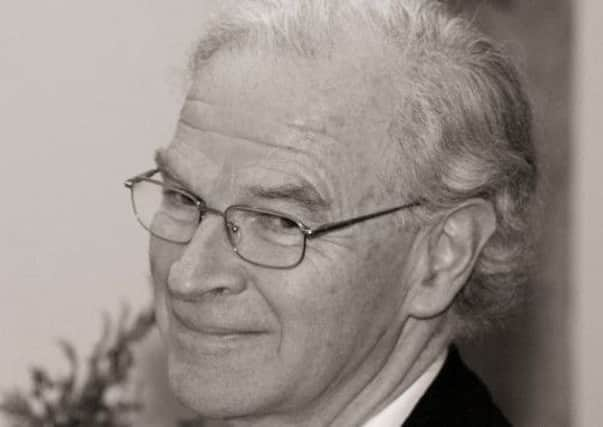Obituary: Philip Maxwell, renewables champion and soldier


PHILIP Maxwell was a former army captain whose enthusiasm for renewable energy took Islay to the forefront of the movement to exploit local assets for the good of the community.
He already had wide experience across a broad spectrum of the energy sector when he retired to the island more than a decade ago and instantly recognised its scope for wind and tidal power developments.
Advertisement
Hide AdAdvertisement
Hide AdHe subsequently set up the Islay Energy Trust, which he chaired from 2008, and established a Community Benefit Society, raising more than half a million pounds towards erecting a community-owned wind turbine which was completed over this past winter. The project will bring in up to £80,000 annually, an achievement due in no small part to his powers of persuasion – he was a man who would simply not take “No” for an answer.
The eldest of a family of four, he was born in London to Lieutenant Colonel Peter Maxwell of the Highland Light Infantry, and his wife Patience. He attended Selwyn House Prep School and then Wellington College, Berkshire.
Commissioned in 1966, through the Mons Officer Cadet School, he joined the Royal Highland Fusiliers in Iserlohn in the British Army of the Rhine’s sector of North Germany. The following year, after a brief spell in command of a platoon of Saracen armoured personnel carriers, he moved to Fort George in Inverness, where he took charge of the battalion’s mountaineering and mountain rescue team. In 1968 the regiment was posted to guard the northern front of Gibraltar.
Maxwell later went to the Royal Military College of Science at Shrivenham to study for a BSc and subsequently completed a postgraduate qualification in forestry and silviculture at Oxford University.
During ten years in the army he also served in Belfast and Singapore, where he was the regimental signals officer. In 1971 he and two close army colleagues led an expedition from the UK to Singapore, driving overland in two Mini Mokes and four Land Rovers. Two months later they arrived at their destination with one Mini Moke, two Land Rovers and almost the original number of soldiers.
The original expedition aim was to explore and climb in eastern Afghanistan and find white cranes for the Fauna Preservation Society. Their goal was achieved, but only just, as time ran short and the expedition eventually became a dash down the Khyber Pass to Calcutta to catch a waiting ship around Burma, then a closed country. Maxwell was credited with the success of the venture, a steady hand at the helm throughout.
After leaving the army in 1977 he took a job with the Scottish Woodland Owners Association where he spent five years, working out of bases in Lochgilphead, Fort William and Dumfries.
In 1982 he moved to Shell as an executive in its forestry, gas, oil and coal divisions, with responsibility for projects in South America, South Africa, Oman, India and China. Having garnered a wide knowledge of the energy sector, he recognised that the future of energy generation lay with sustainable, cleaner power sources and so when he and his wife moved to Islay he immediately appreciated the potential on his doorstep. But while he was aware of the considerable renewable energy resources from wind and tidal power, he also knew that it would need concerted local efforts to ensure that local communities would reap the full benefits.
Advertisement
Hide AdAdvertisement
Hide AdThat was the ethos behind the Islay Energy Trust, a community-owned charity whose main purpose is to generate financial and social benefits from renewable energy operations for the island. It has hugely raised awareness of the importance of renewables on Islay, Jura and Colonsay, where solar panels and heat pumps are among the schemes now used to provide domestic energy, and championed the importance of fuel economy, home insulation and carbon saving.
During his chairmanship of the trust, Maxwell became the local contact for ScottishPower Renewables when they were investigating the Sound of Islay as a site for underwater turbines. He suggested they should have a presence on the island and in 2009 both organisations signed a memorandum of understanding to develop a tidal energy project, leading to a local project officer being employed, a move that brought both money and work to the island.
He also approached the Climate Challenge Fund with a proposal to conduct a survey on insulation needs, resulting in a worker being employed for three years and 400 homes, various community buildings and village halls being insulated free of charge.
In addition he investigated small-scale wind and hydro projects and negotiated with Crown Estates for the lease of an area of seabed to be used by developers of tidal current generating devices. Latterly he had been hoping the trust could acquire the Limpet, the world’s first commercial wave power station, but was disappointed to discover that Ofgem regulations precluded the support which would have enabled the trust to take the project forward.
Always on the lookout for opportunities, he had the skills, contacts, drive and determination to pursue a goal and see it through to the end. It also helped that anyone he had in his sights found it difficult to say no to him. His legacy is undoubtedly the Community Benefit Society and its wind turbine project which, without him, would simply not have happened.
Outwith his work for the trust, he enjoyed a number of other interests including philosophy, religion and mountaineering – Alpine conquests included the Matterhorn and the Eiger. He was also a keen singer, a member of Islay’s Gaelic choir and ran hugely popular singing courses, “Smaull Song”, named after his home on the island.
He is survived by his wife Briar and two sons Rory and Andrew.